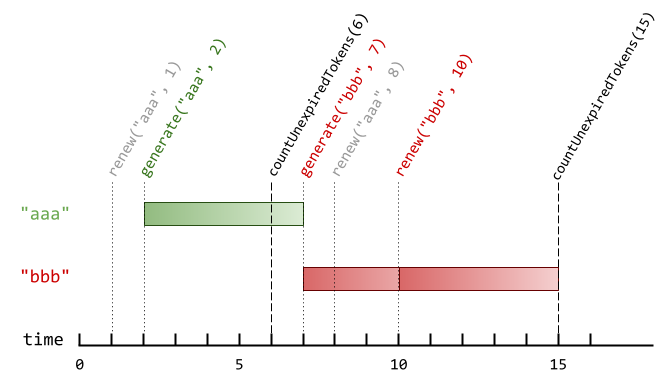There is an authentication system that works with authentication tokens. For each session, the user will receive a new authentication token that will expire timeToLive seconds after the currentTime. If the token is renewed, the expiry time will be extended to expire timeToLive seconds after the (potentially different) currentTime.
Implement the AuthenticationManager class:
AuthenticationManager(int timeToLive)constructs theAuthenticationManagerand sets thetimeToLive.generate(string tokenId, int currentTime)generates a new token with the giventokenIdat the givencurrentTimein seconds.renew(string tokenId, int currentTime)renews the unexpired token with the giventokenIdat the givencurrentTimein seconds. If there are no unexpired tokens with the giventokenId, the request is ignored, and nothing happens.countUnexpiredTokens(int currentTime)returns the number of unexpired tokens at the given currentTime.
Note that if a token expires at time t, and another action happens on time t (renew or countUnexpiredTokens), the expiration takes place before the other actions.
Example 1:
Input ["AuthenticationManager", "renew", "generate", "countUnexpiredTokens", "generate", "renew", "renew", "countUnexpiredTokens"] [[5], ["aaa", 1], ["aaa", 2], [6], ["bbb", 7], ["aaa", 8], ["bbb", 10], [15]] Output [null, null, null, 1, null, null, null, 0]Explanation AuthenticationManager authenticationManager = new AuthenticationManager(5); // Constructs the AuthenticationManager with
timeToLive= 5 seconds. authenticationManager.renew("aaa", 1); // No token exists with tokenId "aaa" at time 1, so nothing happens. authenticationManager.generate("aaa", 2); // Generates a new token with tokenId "aaa" at time 2. authenticationManager.countUnexpiredTokens(6); // The token with tokenId "aaa" is the only unexpired one at time 6, so return 1. authenticationManager.generate("bbb", 7); // Generates a new token with tokenId "bbb" at time 7. authenticationManager.renew("aaa", 8); // The token with tokenId "aaa" expired at time 7, and 8 >= 7, so at time 8 therenewrequest is ignored, and nothing happens. authenticationManager.renew("bbb", 10); // The token with tokenId "bbb" is unexpired at time 10, so therenewrequest is fulfilled and now the token will expire at time 15. authenticationManager.countUnexpiredTokens(15); // The token with tokenId "bbb" expires at time 15, and the token with tokenId "aaa" expired at time 7, so currently no token is unexpired, so return 0.
Constraints:
1 <= timeToLive <= 1081 <= currentTime <= 1081 <= tokenId.length <= 5tokenIdconsists only of lowercase letters.- All calls to
generatewill contain unique values oftokenId. - The values of
currentTimeacross all the function calls will be strictly increasing. - At most
2000calls will be made to all functions combined.
Related Topics:
Hash Table, Design
// OJ: https://leetcode.com/problems/design-authentication-manager/
// Author: github.com/lzl124631x
// Time:
// AuthenticationManager: O(1)
// generate: O(1)
// renew: O(N)
// countUnexpiredTokens: O(N)
// Space: O(N)
class AuthenticationManager {
int ttl;
unordered_map<string, int> m;
void expire(int time) {
vector<string> del;
for (auto &[s, t] : m) {
if (t <= time) del.push_back(s);
}
for (auto &d : del) m.erase(d);
}
public:
AuthenticationManager(int timeToLive) : ttl(timeToLive) {}
void generate(string tokenId, int currentTime) {
m[tokenId] = currentTime + ttl;
}
void renew(string tokenId, int currentTime) {
expire(currentTime);
if (m.count(tokenId)) m[tokenId] = currentTime + ttl;
}
int countUnexpiredTokens(int currentTime) {
expire(currentTime);
return m.size();
}
};
Another way of expire -- erasing during traverse
void expire(int time) {
for (auto it = m.begin(); it != m.end();) {
if (it->second <= time) it = m.erase(it);
else ++it;
}
}